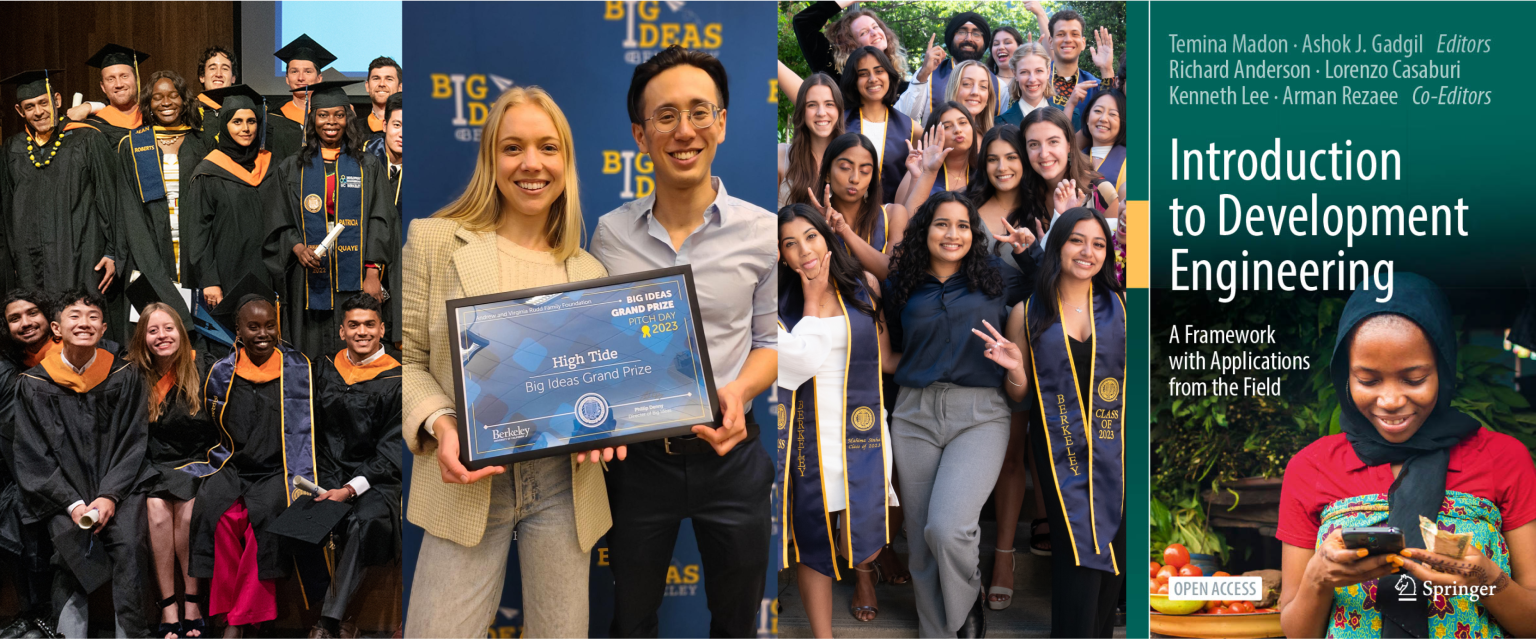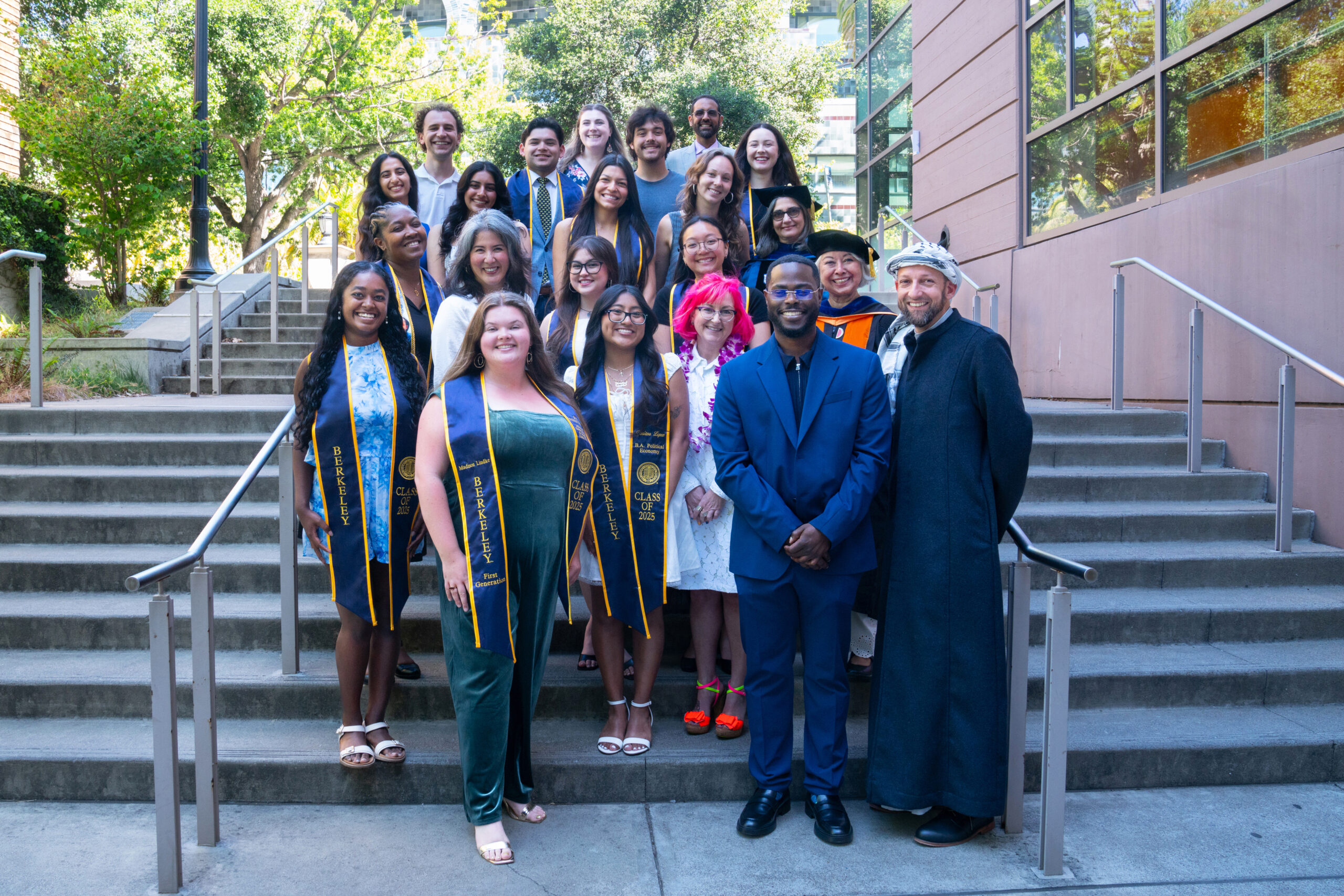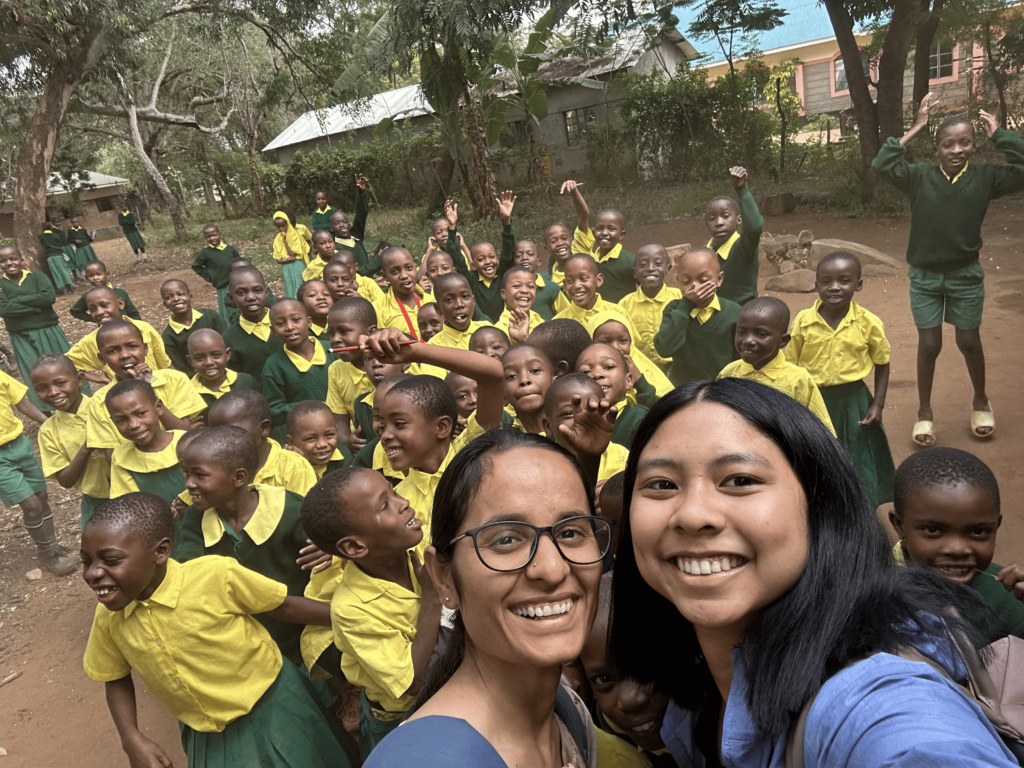This past academic year has, dare we say it, felt more or less normal. We were, in a most literal sense, finally and consistently together again.
After what felt like ages in a pandemic bubble of Zoom classes, working from home, and frightful news headlines, the Blum Center and Berkeley campus have returned to a state of relative and in-person normalcy: classrooms returning to capacity, events at Blum Hall multiplying, rediscovering the delight of cake and coffee at a staff meeting. While we remain vigilant in our health precautions, May 2023, the final month of the academic year, saw the end of COVID-19 as a WHO global health emergency — a hopeful coda to 2022–23.
The past year also witnessed momentous firsts in our Development Engineering community and some impressive triumphs by students well on their ways to making tangible impacts on real-world problems. Below are some highlights.
Welcome, MDevEng Class of 2023!
In August, the second-ever cohort of our Master of Development Engineering program arrived at Blum Hall to begin their three semesters of study. Hailing from 10 different countries, the class came in with experience in everything from designing shelters for victims of gender-based violence in remote villages in Indonesia, to prototyping and testing affordable greenhouses for hundreds of smallholder farmers in India, to developing solar power projects in Peru and Tanzania.
The three dozen new grad students all seemed to agree on one thing at their Aug. 23 orientation, however: “The food in Berkeley is so good!”
Prof. Brad DeLong publishes book on economic history of the “long 20th century”
In September, economics professor and our chief economist Brad DeLong published Slouching Towards Utopia, an expansive account of the economic history and technological changes from 1870 to 2010, surveying “the monumental transformations — and failed promises — brought about by an extraordinary rise in prosperity.”
“While the past 150 years have solved the problem of baking a large enough economic pie for everyone to potentially have enough,” DeLong said, “the problems of properly slicing and then enjoying that potentially ample economic pie have flummoxed us as a species.”
The Financial Times and The Economist named Slouching Towards Utopia one of their best books of 2022.
Professors Gadgil and Madon publish Development Engineering’s first textbook
Speaking of books, a mere three days after DeLong’s book debuted, the first-ever textbook dedicated to Development Engineering hit publisher Springer’s website.
Civil and environmental engineering Prof. Ashok Gadgil and colleague Temina Madon of Haas School of Business edited the free-to-download Introduction to Development Engineering: A Framework with Applications from the Field, which racked up 30,000 downloads in its first few weeks.
The book features 19 case-study projects, from fintech for rural markets in sub-Saharan Africa to stopping arsenic poisoning in India to protecting electoral integrity in emerging democracies, along with four framework chapters on the field’s history, ethical challenges, and philosophical roots.
Our first Master of Development Engineering graduates!
In December, the inaugural MDevEng cohort received the U.S.’s (if not the world’s) first master’s degrees in Development Engineering. In designing and implementing interventions in accordance with and for people in low-resource settings, the 44 students’ capstone projects included a business for seamstresses in rural Ghana to sell their high-quality wares, advancing an initiative to bring arsenic-safe drinking water to rural cities in California, and a blockchain-certified recruiting platform enabling Nigerian students to close the gap between job seekers and employers.
“You have become the precedent for what this program can and will become: a program marked by educating and equipping changemakers to develop innovative global solutions,” said commencement speaker Prof. Maya Carrasquillo. “What a powerful vision, and each of you embodies that so much.”
Kara Nelson named head of the Graduate Group in Development Engineering
This past spring, civil and environmental engineering Prof. Kara Nelson was named head of the Graduate Group in Development Engineering, where she oversees the growth and direction of our DevEng programs and initiatives.
Prof. Nelson took over from retiring mechanical engineering Prof. Alice Agogino, a key force behind the creation of our DevEng programs who also served, among many other positions and distinctions, as the Blum Center’s education director and leader of the MDevEng’s Sustainable Design Innovations track.
And this year’s Big Ideas grand prize goes to…
…High Tide, a Berkeley student duo replacing plastic coatings with bio-based coatings for single-use products that allow them to be composted and recycled. Of the 23 finalists at May 3’s Big Ideas Grand Prize Pitch Day at Blum Hall, judges awarded Ivan Jayapurna and Kira Erickson the $10,000 grand prize.
“The concept behind High Tide was born out of a realization that the majority of our paper products are destined for landfill, despite paper being a compostable and recyclable material,” Erickson said. “It’s an extremely pervasive yet less widely known issue. The potential for systemic impact is massive if addressed properly.”
2ndWind, which assists small- and medium-sized businesses once their owners retire, earned the Lab for Inclusive FinTech (LIFT) “FinTech for Social Good” Initiative award.
Global Poverty and Practice minor graduates its 16th class
Sixty more students — all of whom had to adapt their studies and practice experiences to pandemic-caused restrictions — joined the GPP minor’s 1,000-plus–member alumni community on May 15 in a commencement ceremony infused with gratitude and optimism.
“There is so much power in recognizing the process of working for change as its own reward: All one has to do is stay the course, regardless of where the path leads,” said one student speaker, Samyukta Shrivatsa.
“GPP has been a process of tearing down everything we thought we knew about the world and rewriting the stories we tell about it,” she told her peers. And the story that GPP tells?
“One of audacious hope in the world and each other.”
Thank you to our students!
We’ve had the honor of directly serving more than 1,000 undergraduate and graduate students this year — practitioners of poverty alleviation, health-technology innovators, development engineers, social entrepreneurs, and more. And we look forward to serving many more in 2023–24! Please let us know how we can help.




